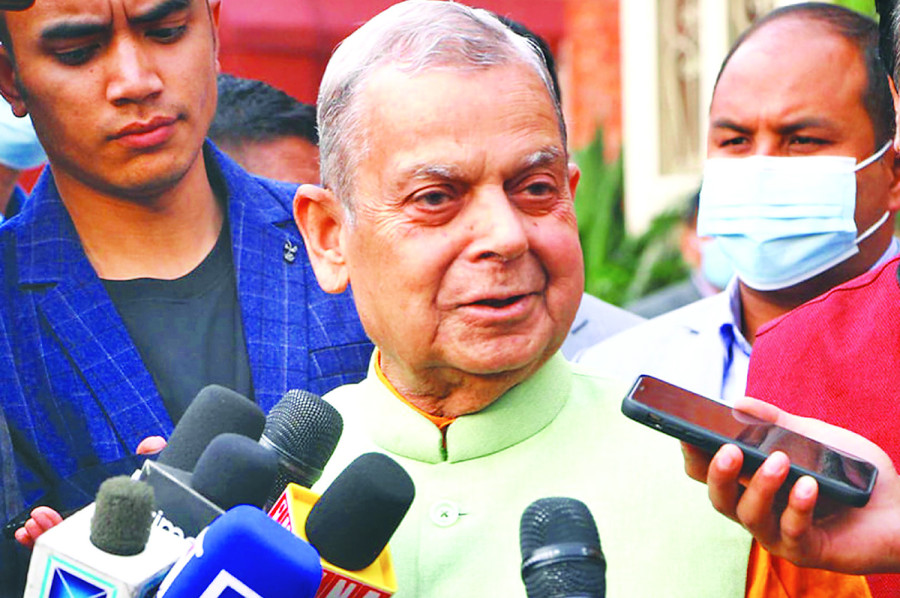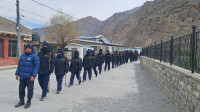Politics
Janata Samajbadi in a bid to bring a new twist to the tale of Nepal politics
The party says it is ready to lead the government, a condition that could leave Oli in a precarious position.
Anil Giri
Nepali parties’ political games have continued without cease even as the coronavirus ravages the country, and this time, it is the Janata Samajbadi Party, the fourth largest force in Parliament, which appears to be creating a new twist in national politics.
The party, which was divided during Prime Minister KP Sharma Oil’s confidence vote on May 10 with half of its lawmakers voting against and the remaining half staying neutral, now is trying to show a united face.
And in doing so, insiders say, the Janata Samajbadi, which has 34 members (two suspended) in the House, is planning to stake its claim to the government.
As many as 15 lawmakers from the Mahantha Thakur-Rajendra Mahato faction had stayed neutral during the May 10 vote, while 15 from the Upendra Yadav-Baburam Bhattarai faction had voted against Oli.
The Thakur-Mahato faction’s refusal to support the Nepali Congress and the Communist Party of Nepal (Maoist Centre) had led to Oli’s return to Baluwatar three days later.
There were talks about the Thakur-Mahato faction joining the Oli Cabinet.
However, a meeting of the party’s senior leadership on Tuesday decided that the party will not participate in the Oli government.
The Janata Samajbadi will rather take an initiative to form a new government under its own leadership or if there are chances of a consensus government, according to a statement undersigned by Thakur and Yadav, who jointly chair the party.
Since Oli was appointed prime minister on May 13 as per Article 76 (3) as the leader of the party with the highest number of members in the House, he needs to secure a vote of confidence from the House within 30 days–by June 14.
If the Thakur-Mahato faction stays neutral again, the government will fall.
In that case, as per the party’s plan, according to insiders, leaders will stake claim to the government as per Article 76 (5), proposing Thakur as the next prime minister.
Article 76 (5) is the last of the provisions in the constitution for the formation of a new government, as parties have already used up other provisions–Articles 76(1), 76 (2) and 76 (3).
Oli managed to return to Baluwatar after the parties–the Congress and the Maoist Centre–failed to form a new government as per Article 76 (2) within the deadline set by the President.
But for the Janata Samajbadi to form a government under its leadership, it will need the support of either Oli’s CPN-UML, which has 121 votes, or the Congress-Maoist Centre alliance, which commands 110 votes.
In the 271-strong House, any party wishing to form a government must prove 136 votes in its favour.
“Our party reached a stage of a split due to Oli. Now we have to see if Oli supports us or not,” party Chair Upendra Yadav told the Post.
After Oli lost his vote of confidence, a section in the Congress party as well as some leaders from the Janata Samajbadi and the Maoist Centre had attempted to goad Deuba into letting Thakur lead the government so as to unseat Oli.
Deuba, however, was not very keen.
The Congress party said on Tuesday that the Janata Samajbadi’s new decision could affect a new political polarisation in the country.
“For us, there is no hurry to take any decision,” said Ramesh Lekhak, a senior Congress leader. “Let the prime minister go to the House to secure a vote of confidence. If he fails, we will decide our move accordingly.”
According to Lekhak, if the Janata Samajbadi has decided to form a government under its leadership, it will either need the Congress-Maoist alliance’s support or Oli’s support.
“As of now, no cross-party discussions have taken place on the formation of a new government as per Article 76 (5) should Oli fail the confidence vote,” Lekhak told the Post.
Article 76 (5) is, in essence, an extension of Article 76 (2).
It says in cases where the prime minister appointed under 76 (3) fails to obtain a vote of confidence, any member under Article 76 (2) who presents a ground on which he or she can obtain a vote of confidence in the House of Representatives, shall be appointed prime minister by the President.
According to Yadav, the party will stake claim to the government as per Article 76 (5) once Oli fails the vote of confidence, which he can seek anytime before June 14.
“We will hold talks with other opposition parties soon,” Yadav told the Post.
The Janata Samajbadi has called a meeting of the party’s Executive Committee, which has 50 members, on Thursday and Friday to discuss the matter further before taking a decision.
The Thakur-Mahato faction’s decision to stay neutral on May 10 had brought the Janata Samajbadi on the verge of a split.
Now an about turn by the faction, which could save the party’s unity, may put Oli in a precarious situation.
Oli has a difficult choice, analysts say, as he might lose prime ministership in both cases–either he supports the Janata Samajbadi or does not support.
If he supports, his party can remain part of the government, according to the analyst, and if he does not and the Janata Samajbadi gets the support of the Congress-Maoist alliance, Oli’s party will become the opposition.
“Now we have to change our strategy and take a bold decision,” said Bal Krishna Khand, chief whip of the Nepali Congress. “Time has come to unseat Oli. Our leadership must make a move.”
After sensing that the Janata Samajbadi could take a different decision than he had expected, Oli, according to some leaders, has changed his tack.
A Janta Samajbadi leader said Oli on Tuesday evening invited Thakur for talks.
“Oli is asking our party to join his government and also seems flexible about changing the government into a consensus government,” the leader, who is a close aide to Thakur, told the Post.
Tuesday’s was the third meeting between Oli and Thakur in the last three days.
On Monday too, Thakur, according to leaders, held a meeting with Oli and asked the latter to address the demands raised by his party.
A leader said Thakur conveyed to Oli that he was facing a backlash for supporting him.
“Any further delay in addressing our demands could prompt us to seek a new political course,” the leader quoted Thakur as conveying to Oli.
Oli had managed to cultivate the Thakur-Mahato faction by committing to addressing the party’s demands like releasing some cadres and leaders, including Resham Chaudhary, making public a report of a commission that investigated oppression during the 2015 Madhes movement, and amending the constitution, among others.
The Yadav-Bhattarai faction, however, was skeptical.
Oli’s bid to woo the Janata Samajbadi Party stemmed from the crisis he was facing in his own party, as the Madhav Nepal-Jhala Nath Khanal group was upping the ante against him.
Just ahead of Oli’s May 10 vote of confidence, Nepal-Khanal faction’s lawmakers were even ready to resign. As many 28 lawmakers from the faction abstained from voting, thereby leaving Oli with just 93 votes.
Oli could have easily saved his position even without the Nepal-Khanal faction had he managed to cultivate the entire Janata Samajbadi Party.
But after Oli made a comeback to Baluwatar, days after losing the trust vote, the Nepal-Khanal faction made a rapprochement with Oli.
Chandrakishore, a journalist who has closely followed Madhes politics as well as national politics, said Oli does not appear to be keen on addressing the Janata Samajbadi’s demands after he reached an understanding with the Nepal-Khanal faction.
“If Oli does not fulfill the Janata Samajbadi’s demands, why would it support him or even split,” Chandrakishore told the Post.
According to him, Janata Samajbadi’s Tuesday’s decision has certainly set off alarm bells in the Oli camp.
“The Janta Samajbadi is under pressure as it is getting flak from the ground after a faction showed support to Oli. That’s a crucial element. The party’s top brass cannot ignore their electorate,” said Chandra Kishore. “Oli did not imagine that the Janata Samajbadi would make such a strong position within a few days. Also, this is also a message from the party that it is also capable of changing the political course if Oli ignores its demands on any pretext.”
If the Janata Samajbadi indeed sticks to its position of forming a new government under its leadership or helping form a national consensus government, Oli’s early elections plan would be foiled.
So far, speculations were rife that the Thakur-Mahato faction would stay neutral again during Oli’s upcoming vote of confidence, thereby leading to an automatic House dissolution and early polls.
According to insiders in the UML, Oli is weighing multiple options.
Ananda Pokharel, a leader close to Oli who is also the in-charge of the party’s Bagmati Province, said that if the Janata Samajbadi does not want to join the government, it can extend support from outside.
“Since the Janata Samajbadi is the kingmaker now, Tuesday's decision was expected,” Pokharel, who confirmed a meeting between Oli and Thakur, told the Post. “We want to continue the government for a full term, but for that the Janata Samajbadi needs to support us. If the prime minister fails his vote of confidence, it’s but natural that the process to form a new government as per Article 76 (5) will begin. Failure to form the government will lead to House dissolution and elections.”




 20.81°C Kathmandu
20.81°C Kathmandu















